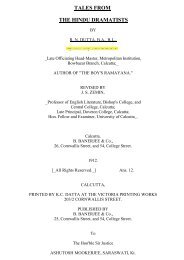TEUTONIC MAGIC - Awaken Video
TEUTONIC MAGIC - Awaken Video
TEUTONIC MAGIC - Awaken Video
You also want an ePaper? Increase the reach of your titles
YUMPU automatically turns print PDFs into web optimized ePapers that Google loves.
16: AESIR<br />
The Aesir are largely gods of spiritual awareness, intellect, and war. The masculine Aesir are generally<br />
characterized by air and/or fire; the feminine (Asynjur), by earth and/or water, often overlapping with the<br />
Vanic goddesses.<br />
ODHINN<br />
The greatest god of the runes is, of course, Odhinn. Saying this, you must keep in mind that the word<br />
"rune" speaks not only of the runic alphabet, but also means "secret." Odhinn is the lord of hidden<br />
wisdom and of the roots of power.<br />
The name Odhinn means "fury" or "inspiration." It is derived from the Indo-European Wodanaz,<br />
"Master of fury/inspiration"[1] and related to the modern German wuetend and archaic English wood, both<br />
of which carry a meaning of "furious," "mad," and "wild." His name has been suggested to be roughly<br />
cognate to that of Vata, Lord of the Winds, in the Rig Veda.<br />
Odhinn's first form was probably that of a wind-god known by his furious rushing through the sky.<br />
He is the leader of the dead, as seen in that most enduring survival of Teutonic lore, the Wild Hunt. The<br />
Wild Hunt is thoroughly documented in every country where Germanic people have settled. It has even<br />
been suggested that the song "Ghost Riders in the Sky" is a contemporary version of the same.[2] This<br />
first naming of Odhinn as the lord of fury and death is one of the keys to his being: considering that fury<br />
is also inspiration and death the pathway to the greatest knowledge, one can see the pattern forming<br />
behind the seemingly capricious and sinister being of the greatest of the gods.<br />
Odhinn's late usurpation of Tyr's position as All-Father brings into focus an interesting anomaly of<br />
Teutonic belief: in no other Indo-European religious system is the god of writing (and/or conductor of the<br />
dead) set in the highest place. The Roman invaders of Germany identified Odhinn with Mercury-both are<br />
psychopomps; both are associated with intelligence, swift movement changeability, and deception; and<br />
both encompass aspects of the archetypal Trickster - characteristics that are not normally associated with<br />
rulership in the Indo-European mind. While it has been suggested that Odhinn is analogous to Varuna as<br />
the king-magician of Dumezil's tripartite Indo-European system, Tyr being the king- judge, the problem<br />
with this is that the cult of Odhinn All-Father is a fairly late development, found and spreading at a time<br />
when the tripartite system might naturally be expected to be breaking down as a consequence of<br />
migration and changing circumstance, rather than shifting back into the exact pattern of the Rig Veda.<br />
Indeed, the tripartite system is not supportable within Germanic social or religious history.<br />
Part of Odhinn's change in status is undoubtedly due to his association with war: from leader of the<br />
dead he became chooser of the dead and Valfather (father of the slain), hence finally the chooser of<br />
victory in battle. However, the primary source of Odhinn's cultic might is the source of his own power:<br />
Odhinn's rise to the All-Father's seat corresponds closely with the rise of runic magic among humans,<br />
both in time and in space. This is borne out by the great importance given to runic wisdom among the<br />
Teutonic peoples and the respect in which those who knew it well were held, as contrasted to the less<br />
complimentary view of the Vanic seidh-magic-the magic of a cult which, though never displaced by the<br />
Aesir and more beloved by the folk than the cult of Odhinn, was nevertheless overshadowed by All-<br />
Father, especially among the skalds, of whom Odhinn was the patron.<br />
As the lord of runes and incantation, Odhinn also became the lord of poetry. The story of his theft<br />
of Odhroerir, the mead of poetry, offers great insight into his nature. Here Odhinn is seen as shapechanger,<br />
trickster, betrayer, rescuer of the hallowed mead, and giver of poetry's power to other wights. He<br />
mingles the holy inspiration which is the height of Teutonic spirituality with oath-breaking, the act most<br />
despicable to the Teutonic mind, because both are part of his purpose; he becomes serpent and eagle at<br />
need.<br />
Thus, by the mystery and paradox of Odhinn's nature, he holds all things within himself. He builds<br />
the walls to ward Midgardhr and Asgardhr, but wanders outside at will. He is a lord of oaths and of<br />
betrayal, of making and unmaking. As a god of war he makes his heroes invincible till he himself comes<br />
to take them in battle. It is said, and rightly, that Odhinn enjoys stirring up strife: only through struggle<br />
134
















